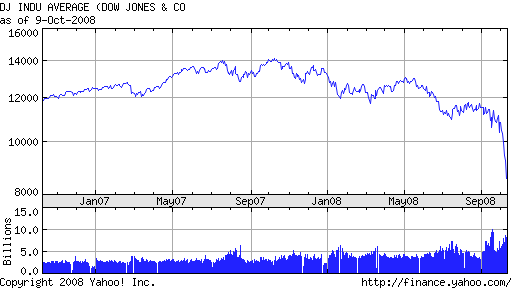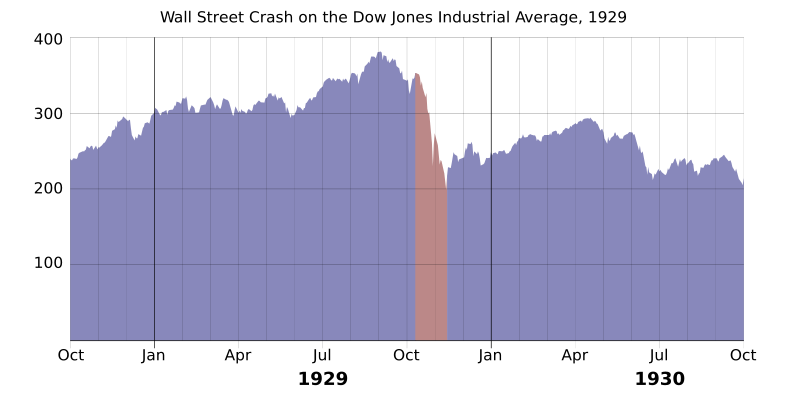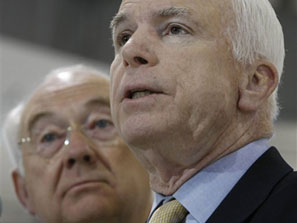Is This Time Going to Be Like 1929?
Hello Friends! Thanks so much for stopping by and visiting my blog, Stock Picks Bob's Advice! As always, please remember that I am an amateur investor, so please remember to consult with your professional investment advisers prior to making any investment decisions based on this website.
How do you describe the trading action on Wall Street?
A "correction"? A "Bear Market"? Or is it more like a slow-motion crash. A crash that isn't really that slow at all!
Let's take a look at a 2-yr chart on the DJIA:

And 1929-1930?

The difference thus far is the degree of the fall. By the end of the crash in 1932, stocks has declined by 91% from their peak.
There are some spooky parallels between 1929 and today.
Looking back on 1929, the Pecora Commission was established to try to determine the cause of the collapse in equities and the problems that bank faced subsequently:
"Following the Wall Street Crash, the U.S. economy had gone into a depression, and a large number of banks failed. The Pecora Commission initiated major reform of the American financial system. As Chief Counsel, Ferdinand Pecora personally examined many high-profile witnesses that included some of the nation's most influential bankers and stockbrokers. As the Commission's first witness, Richard Whitney, president of the New York Stock Exchange, declared that "The Exchange's refusal to pay heed to popular demand for reform was simply a manifestation of courage to do those things which are right, regardless of how unpopular they may be for the time being." Other important members of the Wall Street financial community to give testimony before the Commission included investment bankers Otto H. Kahn, Charles E. Mitchell, Thomas W. Lamont, and Albert H. Wiggin, plus celebrated commodity market speculators such as Arthur W. Cutten. Given wide media coverage, the testimony of the powerful banker J.P. Morgan, Jr. caused a public outcry after he admitted under examination that he and many of his partners had not paid any income taxes in 1931 and 1932.
As reiterated by SEC Chairman Arthur Levitt during his 1995 testimony before the United States House of Representatives, the Pecora Commission uncovered a wide range of abusive practices on the part of banks and bank affiliates. These included a variety of conflicts of interest such as the underwriting of unsound securities in order to pay off bad bank loans as well as "pool operations" to support the price of bank stocks. The hearings galvanized broad public support for new securities laws. As a result of the Pecora Commission's findings, the United States Congress passed the Securities Act of 1933 and the Securities Exchange Act of 1934, instituting disclosure laws for corporations seeking public financing, and in 1935 formed the SEC as a means to enforce the new Acts."
One of the major reforms to come out of the 1929 crash and the Pecora Commission was Glass-Steagall:
"Following the Great Crash of 1929, one of every five banks in America fails. Many people, especially politicians, see market speculation engaged in by banks during the 1920s as a cause of the crash.
In 1933, Senator Carter Glass (D-Va.) and Congressman Henry Steagall (D-Ala.) introduce the historic legislation that bears their name, seeking to limit the conflicts of interest created when commercial banks are permitted to underwrite stocks or bonds. In the early part of the century, individual investors were seriously hurt by banks whose overriding interest was promoting stocks of interest and benefit to the banks, rather than to individual investors. The new law bans commercial banks from underwriting securities, forcing banks to choose between being a simple lender or an underwriter (brokerage). The act also establishes the Federal Deposit Insurance Corporation (FDIC), insuring bank deposits, and strengthens the Federal Reserve's control over credit.
The Glass-Steagall Act passes after Ferdinand Pecora, a politically ambitious former New York City prosecutor, drums up popular support for stronger regulation by hauling bank officials in front of the Senate Banking and Currency Committee to answer for their role in the stock-market crash.
In 1956, the Bank Holding Company Act is passed, extending the restrictions on banks, including that bank holding companies owning two or more banks cannot engage in non-banking activity and cannot buy banks in another state."
And the rest of the same article:
| | 1960s-70s
| First efforts to loosen Glass-Steagall restrictions | |
|
Beginning in the 1960s, banks lobby Congress to allow them to enter the municipal bond market, and a lobbying subculture springs up around Glass-Steagall. Some lobbyists even brag about how the bill put their kids through college. In the 1970s, some brokerage firms begin encroaching on banking territory by offering money-market accounts that pay interest, allow check-writing, and offer credit or debit cards.
|
|
| |
| | 1986-87
| Fed begins reinterpreting Glass-Steagall; Greenspan becomes Fed chairman | |
|
In December 1986, the Federal Reserve Board, which has regulatory jurisdiction over banking, reinterprets Section 20 of the Glass-Steagall Act, which bars commercial banks from being "engaged principally" in securities business, deciding that banks can have up to 5 percent of gross revenues from investment banking business. The Fed Board then permits Bankers Trust, a commercial bank, to engage in certain commercial paper (unsecured, short-term credit) transactions. In the Bankers Trust decision, the Board concludes that the phrase "engaged principally" in Section 20 allows banks to do a small amount of underwriting, so long as it does not become a large portion of revenue. This is the first time the Fed reinterprets Section 20 to allow some previously prohibited activities. In the spring of 1987, the Federal Reserve Board votes 3-2 in favor of easing regulations under Glass-Steagall Act, overriding the opposition of Chairman Paul Volcker. The vote comes after the Fed Board hears proposals from Citicorp, J.P. Morgan and Bankers Trust advocating the loosening of Glass-Steagall restrictions to allow banks to handle several underwriting businesses, including commercial paper, municipal revenue bonds, and mortgage-backed securities. Thomas Theobald, then vice chairman of Citicorp, argues that three "outside checks" on corporate misbehavior had emerged since 1933: "a very effective" SEC; knowledgeable investors, and "very sophisticated" rating agencies. Volcker is unconvinced, and expresses his fear that lenders will recklessly lower loan standards in pursuit of lucrative securities offerings and market bad loans to the public. For many critics, it boiled down to the issue of two different cultures - a culture of risk which was the securities business, and a culture of protection of deposits which was the culture of banking. In March 1987, the Fed approves an application by Chase Manhattan to engage in underwriting commercial paper, applying the same reasoning as in the 1986 Bankers Trust decision, and in April it issues an order outlining its rationale. While the Board remains sensitive to concerns about mixing commercial banking and underwriting, it states its belief that the original Congressional intent of "principally engaged" allowed for some securities activities. The Fed also indicates that it will raise the limit from 5 percent to 10 percent of gross revenues at some point in the future. The Board believes the new reading of Section 20 will increase competition and lead to greater convenience and increased efficiency. In August 1987, Alan Greenspan -- formerly a director of J.P. Morgan and a proponent of banking deregulation -- becomes chairman of the Federal Reserve Board. One reason Greenspan favors greater deregulation is to help U.S. banks compete with big foreign institutions.
|
|
| |
| | 1989-1990
| Further loosening of Glass-Steagall | |
|
In January 1989, the Fed Board approves an application by J.P. Morgan, Chase Manhattan, Bankers Trust, and Citicorp to expand the Glass-Steagall loophole to include dealing in debt and equity securities in addition to municipal securities and commercial paper. This marks a large expansion of the activities considered permissible under Section 20, because the revenue limit for underwriting business is still at 5 percent. Later in 1989, the Board issues an order raising the limit to 10 percent of revenues, referring to the April 1987 order for its rationale. In 1990, J.P. Morgan becomes the first bank to receive permission from the Federal Reserve to underwrite securities, so long as its underwriting business does not exceed the 10 percent limit.
|
|
| |
| | 1980s-90s
| Congress repeatedly tries and fails to repeal Glass-Steagall | |
|
In 1984 and 1988, the Senate passes bills that would lift major restrictions under Glass-Steagall, but in each case the House blocks passage. In 1991, the Bush administration puts forward a repeal proposal, winning support of both the House and Senate Banking Committees, but the House again defeats the bill in a full vote. And in 1995, the House and Senate Banking Committees approve separate versions of legislation to get rid of Glass-Steagall, but conference negotiations on a compromise fall apart. Attempts to repeal Glass-Steagall typically pit insurance companies, securities firms, and large and small banks against one another, as factions of these industries engage in turf wars in Congress over their competing interests and over whether the Federal Reserve or the Treasury Department and the Comptroller of the Currency should be the primary banking regulator.
|
| |
| |
| | 1996-1997
| Fed renders Glass-Steagall effectively obsolete | |
| |
In December 1996, with the support of Chairman Alan Greenspan, the Federal Reserve Board issues a precedent-shattering decision permitting bank holding companies to own investment bank affiliates with up to 25 percent of their business in securities underwriting (up from 10 percent). This expansion of the loophole created by the Fed's 1987 reinterpretation of Section 20 of Glass-Steagall effectively renders Glass-Steagall obsolete. Virtually any bank holding company wanting to engage in securities business would be able to stay under the 25 percent limit on revenue. However, the law remains on the books, and along with the Bank Holding Company Act, does impose other restrictions on banks, such as prohibiting them from owning insurance-underwriting companies. In August 1997, the Fed eliminates many restrictions imposed on "Section 20 subsidiaries" by the 1987 and 1989 orders. The Board states that the risks of underwriting had proven to be "manageable," and says banks would have the right to acquire securities firms outright. In 1997, Bankers Trust (now owned by Deutsche Bank) buys the investment bank Alex. Brown & Co., becoming the first U.S. bank to acquire a securities firm.
|
|
| |
| | 1997
| Sandy Weill tries to merge Travelers and J.P. Morgan; acquires Salomon Brothers | |
|
In the summer of 1997, Sandy Weill, then head of Travelers insurance company, seeks and nearly succeeds in a merger with J.P. Morgan (before J.P. Morgan merged with Chemical Bank), but the deal collapses at the last minute. In the fall of that year, Travelers acquires the Salomon Brothers investment bank for $9 billion. (Salomon then merges with the Travelers-owned Smith Barney brokerage firm to become Salomon Smith Barney.)
|
|
| |
| | April 1998
| Weill and John Reed announce Travelers-Citicorp merger | |
|
At a dinner in Washington in February 1998, Sandy Weill of Travelers invites Citicorp's John Reed to his hotel room at the Park Hyatt and proposes a merger. In March, Weill and Reed meet again, and at the end of two days of talks, Reed tells Weill, "Let's do it, partner!" On April 6, 1998, Weill and Reed announce a $70 billion stock swap merging Travelers (which owned the investment house Salomon Smith Barney) and Citicorp (the parent of Citibank), to create Citigroup Inc., the world's largest financial services company, in what was the biggest corporate merger in history. The transaction would have to work around regulations in the Glass-Steagall and Bank Holding Company acts governing the industry, which were implemented precisely to prevent this type of company: a combination of insurance underwriting, securities underwriting, and commecial banking. The merger effectively gives regulators and lawmakers three options: end these restrictions, scuttle the deal, or force the merged company to cut back on its consumer offerings by divesting any business that fails to comply with the law. Weill meets with Alan Greenspan and other Federal Reserve officials before the announcement to sound them out on the merger, and later tells the Washington Post that Greenspan had indicated a "positive response." In their proposal, Weill and Reed are careful to structure the merger so that it conforms to the precedents set by the Fed in its interpretations of Glass-Steagall and the Bank Holding Company Act. Unless Congress changed the laws and relaxed the restrictions, Citigroup would have two years to divest itself of the Travelers insurance business (with the possibility of three one-year extensions granted by the Fed) and any other part of the business that did not conform with the regulations. Citigroup is prepared to make that promise on the assumption that Congress would finally change the law -- something it had been trying to do for 20 years -- before the company would have to divest itself of anything. Citicorp and Travelers quietly lobby banking regulators and government officials for their support. In late March and early April, Weill makes three heads-up calls to Washington: to Fed Chairman Greenspan, Treasury Secretary Robert Rubin, and President Clinton. On April 5, the day before the announcement, Weill and Reed make a ceremonial call on Clinton to brief him on the upcoming announcement. The Fed gives its approval to the Citicorp-Travelers merger on Sept. 23. The Fed's press release indicates that "the Board's approval is subject to the conditions that Travelers and the combined organization, Citigroup, Inc., take all actions necessary to conform the activities and investments of Travelers and all its subsidiaries to the requirements of the Bank Holding Company Act in a manner acceptable to the Board, including divestiture as necessary, within two years of consummation of the proposal. ... The Board's approval also is subject to the condition that Travelers and Citigroup conform the activities of its companies to the requirements of the Glass-Steagall Act."
|
|
| |
| | 1998-1999
| Intense new lobbying effort to repeal Glass-Steagall | |
|
Following the merger announcement on April 6, 1998, Weill immediately plunges into a public-relations and lobbying campaign for the repeal of Glass-Steagall and passage of new financial services legislation (what becomes the Financial Services Modernization Act of 1999). One week before the Citibank-Travelers deal was announced, Congress had shelved its latest effort to repeal Glass-Steagall. Weill cranks up a new effort to revive bill. Weill and Reed have to act quickly for both business and political reasons. Fears that the necessary regulatory changes would not happen in time had caused the share prices of both companies to fall. The House Republican leadership indicates that it wants to enact the measure in the current session of Congress. While the Clinton administration generally supported Glass-Steagall "modernization," but there are concerns that mid-term elections in the fall could bring in Democrats less sympathetic to changing the laws. In May 1998, the House passes legislation by a vote of 214 to 213 that allows for the merging of banks, securities firms, and insurance companies into huge financial conglomerates. And in September, the Senate Banking Committee votes 16-2 to approve a compromise bank overhaul bill. Despite this new momentum, Congress is yet again unable to pass final legislation before the end of its session. As the push for new legislation heats up, lobbyists quip that raising the issue of financial modernization really signals the start of a fresh round of political fund-raising. Indeed, in the 1997-98 election cycle, the finance, insurance, and real estate industries (known as the FIRE sector), spends more than $200 million on lobbying and makes more than $150 million in political donations. Campaign contributions are targeted to members of Congressional banking committees and other committees with direct jurisdiction over financial services legislation.
|
|
| |
| | Oct.-Nov. 1999
| Congress passes Financial Services Modernization Act | |
|
After 12 attempts in 25 years, Congress finally repeals Glass-Steagall, rewarding financial companies for more than 20 years and $300 million worth of lobbying efforts. Supporters hail the change as the long-overdue demise of a Depression-era relic. On Oct. 21, with the House-Senate conference committee deadlocked after marathon negotiations, the main sticking point is partisan bickering over the bill's effect on the Community Reinvestment Act, which sets rules for lending to poor communities. Sandy Weill calls President Clinton in the evening to try to break the deadlock after Senator Phil Gramm, chairman of the Banking Committee, warned Citigroup lobbyist Roger Levy that Weill has to get White House moving on the bill or he would shut down the House-Senate conference. Serious negotiations resume, and a deal is announced at 2:45 a.m. on Oct. 22. Whether Weill made any difference in precipitating a deal is unclear. On Oct. 22, Weill and John Reed issue a statement congratulating Congress and President Clinton, including 19 administration officials and lawmakers by name. The House and Senate approve a final version of the bill on Nov. 4, and Clinton signs it into law later that month. Just days after the administration (including the Treasury Department) agrees to support the repeal, Treasury Secretary Robert Rubin, the former co-chairman of a major Wall Street investment bank, Goldman Sachs, raises eyebrows by accepting a top job at Citigroup as Weill's chief lieutenant. The previous year, Weill had called Secretary Rubin to give him advance notice of the upcoming merger announcement. When Weill told Rubin he had some important news, the secretary reportedly quipped, "You're buying the government?"
|
And what of the current crisis?
As reported two days ago:
"Radical steps by the Fed under chairman Ben Bernanke — all in the name of seeking to halt the panic sweeping financial markets — are turning it into a financial colossus. They're also putting the government deeper in debt and taxpayers further at risk if the various moves fail.
And it's being done with little direct interaction with Capitol Hill. The Fed does not depend on Congress for its budget, including its payroll, and is as much a creature of the nation's banking system as part of the federal government.
On Tuesday, the Fed announced it will buy vast amounts of corporate debt, some of it unsecured, in hopes of renewing the flow of money in so-called commercial paper markets. That is where many companies turn for short-term loans to finance their most basic day-to-day operations, such as purchasing supplies or making payrolls.
That action came just a day after the Fed increased a short-term loan program to as much as $900 billion by the end of the year — exceeding even the government's $700 billion bailout plan enacted on Friday.
"Almost every day there's a new program. It's almost Rooseveltian, if that's a word," said David Jones, chief economist at DMJ Advisors in Denver and a longtime Fed watcher. He was referring to bold federal programs undertaken by President Franklin D. Roosevelt in the 1930s to battle the Great Depression.
"Certainly, the Fed is pressing against the bounds of its territory as the central bank. But we got into the Depression precisely because the Fed then stood by and watched most of the banking system fail, watched the money supply contract by a third, and did nothing about it. You cannot criticize this Fed for trying to do something about a crisis which has basically shut the flow of credit down to a trickle and poses a threat to the economy," Jones said.
Wall Street was not yet impressed. The Dow Jones industrials sank an additional 508 points.
The Bernanke Fed first invoked rarely used 1930s powers to intervene — with taxpayer backing — in March when it provided a $29 billion loan as part of JPMorgan Chase & Co.'s takeover of Bear Stearns. Since then, it has launched programs to extend loans to nonbank financial companies, to provide backstop insurance for money-market mutual funds and a $85 billion taxpayer-backed loan to bail out American International Group, one of the world's largest insurers.
Bernanke on Tuesday defended the Fed's steps, along with the huge separate bailout program to allow the government to take over hard-to-sell mortgage-related securities now clogging bank balance sheets."
Once again is about bank balance sheets. About securities and derivatives of questionable value threatening the viability of our banking system.
It has taken us 75 years to destroy Glass-Steagall, and in days we are seeing our financial systems now self-destruct as they are overwhelmed with CMO's, CDS's, and an Alphabet-soup of paper of questionable value.
 On a political note, it is interesting that it is Phil Gramm, one of John McCain's tightest advisers who led the recent (1999) Republican moves against Glass-Steagall---as this report (earlier this year) points out:
On a political note, it is interesting that it is Phil Gramm, one of John McCain's tightest advisers who led the recent (1999) Republican moves against Glass-Steagall---as this report (earlier this year) points out:
"The general co-chairman of John McCain’s presidential campaign, former Sen. Phil Gramm (R-Texas), led the charge in 1999 to repeal a Depression-era banking regulation law that Democrat Barack Obama claimed on Thursday contributed significantly to today’s economic turmoil.
“A regulatory structure set up for banks in the 1930s needed to change because the nature of business had changed,” the Illinois senator running for president said in a New York economic speech. “But by the time [it] was repealed in 1999, the $300 million lobbying effort that drove deregulation was more about facilitating mergers than creating an efficient regulatory framework.”
Gramm’s role in the swift and dramatic recent restructuring of the nation’s investment houses and practices didn’t stop there.
A year after the Gramm-Leach-Bliley Act repealed the old regulations, Swiss Bank UBS gobbled up brokerage house Paine Weber. Two years later, Gramm settled in as a vice chairman of UBS’s new investment banking arm.
Later, he became a major player in its government affairs operation. According to federal lobbying disclosure records, Gramm lobbied Congress, the Federal Reserve and the Treasury Department about banking and mortgage issues in 2005 and 2006.
During those years, the mortgage industry pressed Congress to roll back strong state rules that sought to stem the rise of predatory tactics used by lenders and brokers to place homeowners in high-cost mortgages.
For his work, Gramm and two other lobbyists collected $750,000 in fees from UBS’s American subsidiary. In the past year, UBS has written down more than $18 billion in exposure to subprime loans and other risky securities and is considering cutting as many as 8,000 jobs"
But certainly the Democrats have been almost as much at fault as the Republicans in this matter.
Are we headed for a 1929 debacle? I hope not. I really do. But I am afraid that those who pushed hard to deregulate, to get government out of monitoring what banks did, who tried to separate banking and investment activity failed due to the greed of some who sought to maximize profits and stock prices at any cost. So much like they did in 1929.


 On a political note, it is interesting that it is Phil Gramm, one of John McCain's tightest advisers who led the recent (1999) Republican moves against Glass-Steagall---as this report (earlier this year) points out:
On a political note, it is interesting that it is Phil Gramm, one of John McCain's tightest advisers who led the recent (1999) Republican moves against Glass-Steagall---as this report (earlier this year) points out:







